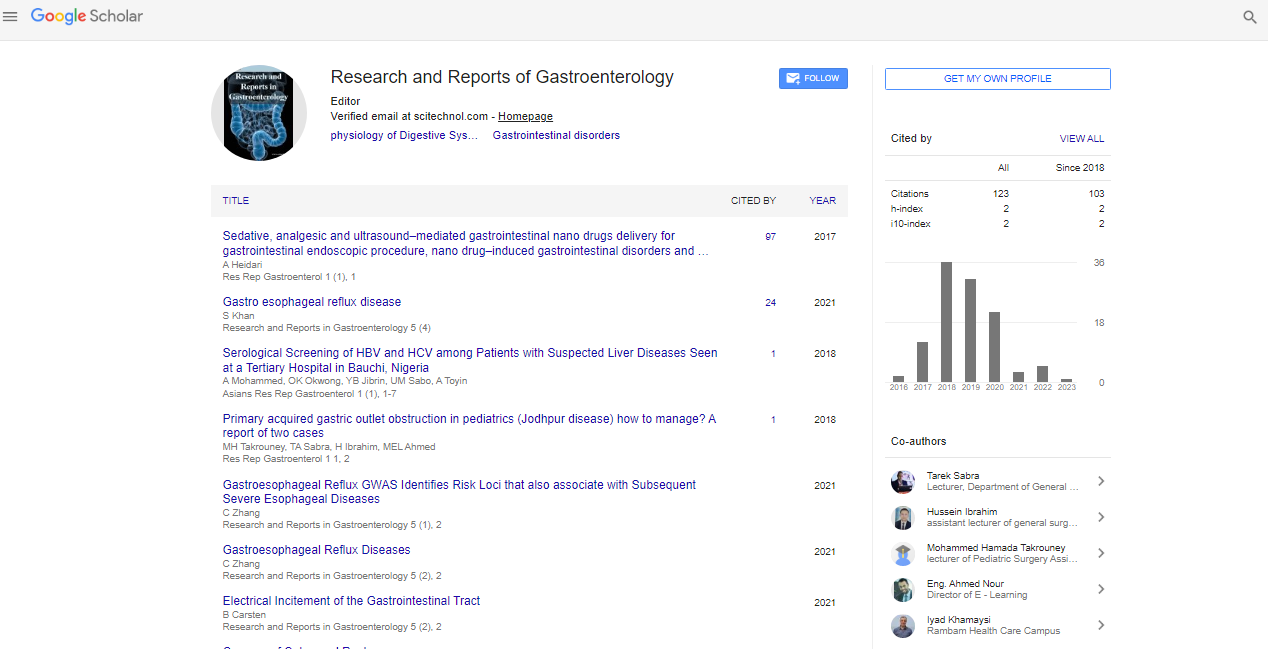Perspective, Res Rep Gastroenterol Vol: 7 Issue: 4
Advancements in Gastrointestinal Cancer Management
Tianhao Cheng*
1Department of Medicine, Nanjing University of Chinese Medicine, Nanjing, China
*Corresponding Author: Tianhao Cheng,
Department of Medicine, Nanjing
University of Chinese Medicine, Nanjing, China
E-mail: chengtianhao@gmail.com
Received date: 20 November, 2023 Manuscript No. RRG-24-124015;
Editor assigned date: 22 November, 2023, PreQC No. RRG-24-124015 (PQ);
Reviewed date: 06 December, 2023, QC No. RRG-24-124015;
Revised date: 13 December, 2023, Manuscript No. RRG-24-124015 (R);
Published date: 20 December, 2023, DOI: 10.4172/Rrg.1000153
Citation: Cheng T (2023) Advancements in Gastrointestinal Cancer Management. Res Rep Gastroenterol 7:4.
Description
Gastrointestinal (GI) cancers constitute a formidable group of malignancies that affect various organs within the digestive system, including the esophagus, stomach, liver, pancreas, and colorectal region. These cancers collectively pose a significant global health burden, with millions of diagnoses each year. Understanding the intricacies of GI cancers is essential for early detection, effective treatment, and improving patient outcomes. In this article, we delve into the complexities of gastrointestinal cancers, exploring risk factors, diagnostic advancements, and the evolving landscape of treatment.
Diversity of gastrointestinal cancers
Colorectal cancer: Colorectal cancer is one of the most common GI malignancies, affecting the colon or rectum. It often begins as a benign growth known as a polyp, which, if left untreated, can develop into cancer over time. Screening methods, such as colonoscopies and stool tests, play a crucial role in early detection and prevention.
Pancreatic cancer: Pancreatic cancer is notorious for its aggressive nature and late-stage diagnosis. The pancreas, a vital organ for digestion and blood sugar regulation, can develop malignant tumors that are often challenging to treat. Advances in imaging technologies and genetic testing are aiding in earlier detection and personalized treatment strategies.
Liver cancer: Liver cancer, which includes hepatocellular carcinoma, is frequently associated with underlying conditions such as chronic hepatitis or cirrhosis. Hepatitis B and C infections, excessive alcohol consumption, and non-alcoholic fatty liver disease are common risk factors. Liver cancer presents a unique challenge due to its intricate relationship with liver function.
Esophageal cancer: Esophageal cancer typically arises in the cells lining the esophagus, the tube connecting the throat to the stomach. Risk factors include tobacco and alcohol use, obesity, and certain medical conditions. Early-stage esophageal cancer may not cause noticeable symptoms, underscoring the importance of regular screenings for high-risk individuals.
Challenges in gastrointestinal cancer diagnosis
Late-stage presentation: A recurring challenge in GI cancers is their propensity to present symptoms in later stages, when the disease has already advanced. Early symptoms may be nonspecific or attributed to other conditions, leading to delayed diagnosis and reduced treatment options.
Screening limitations: While screening methods such as colonoscopies have proven effective for colorectal cancer, other GI cancers lack routine and easily accessible screening tools. This limitation contributes to late-stage diagnoses and underscores the need for ongoing research into reliable screening methods.
Genetic complexity: Gastrointestinal cancers exhibit considerable genetic heterogeneity, making each case unique. Understanding the genetic mutations driving these cancers is crucial for developing targeted therapies. Advances in genomic sequencing have provided valuable insights, paving the way for precision medicine approaches tailored to individual patients.
Immunotherapy breakthroughs: Immunotherapy, which harnesses the body's immune system to fight cancer, has shown promise in treating certain gastrointestinal cancers. Checkpoint inhibitors, a type of immunotherapy, are being investigated for their efficacy in colorectal and liver cancers, offering new hope for patients.
Targeted therapies: The identification of specific molecular targets within cancer cells has led to the development of targeted therapies. Drugs that target particular pathways or mutations associated with GI cancers are providing more effective and less toxic treatment options.
Multidisciplinary approaches: The complexity of GI cancers requires a multidisciplinary approach involving surgeons, oncologists, radiologists, and other specialists. Collaborative efforts aim to tailor treatment plans that address the unique aspects of each patient's cancer, improving overall outcomes.
Gastrointestinal cancers represent a formidable challenge in the landscape of oncology, requiring a comprehensive understanding of their diverse manifestations. While the road ahead is marked by challenges, advancements in early detection, personalized medicine, and innovative therapies offer a glimmer of hope for those affected by these complex malignancies. As research continues to unravel the intricacies of gastrointestinal cancers, the prospect of improved outcomes and enhanced quality of life for patients becomes an increasingly achievable reality.
 Spanish
Spanish  Chinese
Chinese  Russian
Russian  German
German  French
French  Japanese
Japanese  Portuguese
Portuguese  Hindi
Hindi 